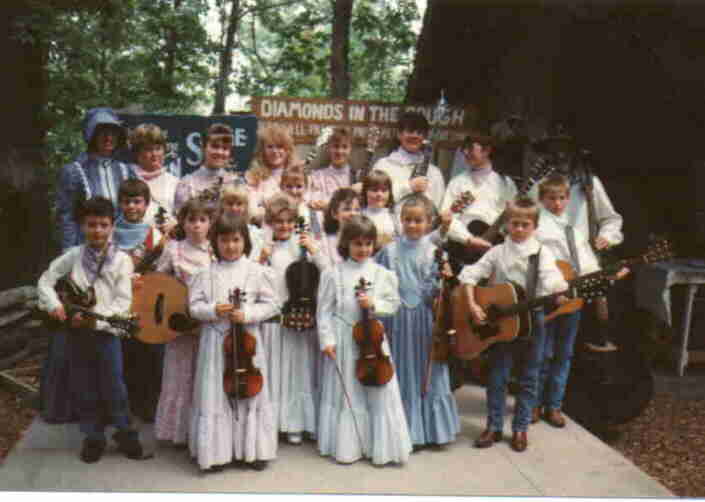The following was published in the National Old Time Fiddler in the early 1990's.
The Blackwell Practical Music Method Student Band

One might not expect student musicians to be performing in public after
only four lessons, but Blackwell Practical Music Method students have done
just that and more. BPM students with as few as 1 1/2 to 2 months
of lessons have even won music awards.
Charlotte Blackwell lives outside of Niangua
in southwest Missouri and teaches fiddle, guitar, banjo, and mandolin at
the Blackwell Music Center, co-owned with her husband, Bob, in nearby Seymour.
She calls her lesson studio the Academy of Practical Music and Performing
Arts where students receive instruction not only in old time music but
music related fields as well.
Her teaching method is appropriately called
the Blackwell Practical Music Method, shortened to the BPM method.
She has already written and copyrighted her lesson books and material and
is writing a book and teachers manual on her method.
Blackwell's Practical Music Method, she says,
"carries the students easily and progressively from one technical acomplishment
to another." Students are taught notes and music theory as well as
ear development and and entertainment skills.
The BPM method allows students interested
in music to progress quickly to a point of playing for friends and even
the public. The system is different from other teaching methods using
unique approaches and insights in dealing with specific technical problems
as they occur. Charlotte Blackwell notes her method has "structure
where it is needed and freedom where it is practical." Bob Blackwell adds,
"And there's fun all the way through it."
The teaching method proved so effective that
as a result the BPM band program was formed. As her students progress,
Blackwell has three student bands in which BPM students can play.
These bands are the Achievers, the beginning band who play in a non-public
format for friends and relatives, the Diamonds in the Rough, Level I, generally
made up of students who have played approximately one year or less, and
the Diamonds in the Rough, Level II, generally composed of those students
who have played a little over two years or less. The Diamonds in the Rough
Bands are the road bands that have played publicly within up to a 200 mile
radius of Seymour.
The band students range in age from 5 to 15
and have played in Missouri, Arkansas, and Oklahoma and in such places
as Silver Dollar City, the Ozark Empire Fair, bluegrass festivals, fiddle
conventions and contests, etc.
inspite of the fact that they have had to enter many open rather than age limit competitions, and inspite of the fact that the BPM fiddler with the most time in the BPM program has only had a little over two years of lessons to date.
Emily Longwith is the student, of current students, with the most time in the program. Emily, now age 8, placed first in her age group at the World Series of Fiddling in Langley in August, and sixth in the Missouri State Championship, at Columbia in September, both of 1989, and already has first place wins in contests for 1990.
Other first place contest winners are Martin Hodges, 12, Leah Givans, 13, and Heidi Owens, 8, who's interviews, accomplishments, and goals along with those of other students in the program will be included in future issues of this newsletter.
BPM fiddlers in schools without stringed instrument programs have both demonstrated the importance of good technique which is stressed in the BPM method and have proven their versatility by working on violin contest pieces during their lessons for school band contests, receiving ones and even going as for as state level competition.
Another positive feature of the BPM method is that it is being used to teach and promote old time music and fiddling. The Blackwells' goal is to see that our American culture's musical heritage continued. Says Charlotte, "most people don't stop to realize that we as Americans have a music that played an important part in shaping our nation and its history. They see ethnic cultures within America and recognize their heritage in both music and other areas, but they neglect to notice that Americans have a musical heritage that knows no ethnic bounds and needs to be preserved, taught to, and carried on by our children if it is to survive."
Blackwell further points out that not only did one of our presidents,Andrew Jackson, play the fiddle himself, but many of the old time fiddle tunes we play today were written right here in the United States. When it comes to other old time instruments, Joel Sweeney of Appomatox, VA, is given credit for inventing the five string banjo, which received so much attention that he got to play his banjo in England for Queen Victoria.
In attempting to preserve our American music history, as well as the performance of the music itself the Blackwells were pioneers in introducing fiddle camps to Missouri, bringing in Art Stamper , the three time winner of the Best Old-Time Fiddler award in Nashville, to teach the workshops in the early 1980's,
which she also helped teach, while her husband, also taught a fiddle repair workshop as an added feature of the fiddle camp. When the Blackwells opened their music store in Seymour they discontinued thier fiddle camps and concentrated their efforts on their store, and Charlotte Blackwell's students and teaching method.
(Information for this article was contributed by Bob and Charlotte Blackwell and information from an article published in Bluegrass Unlimited, Jan. 1990.)